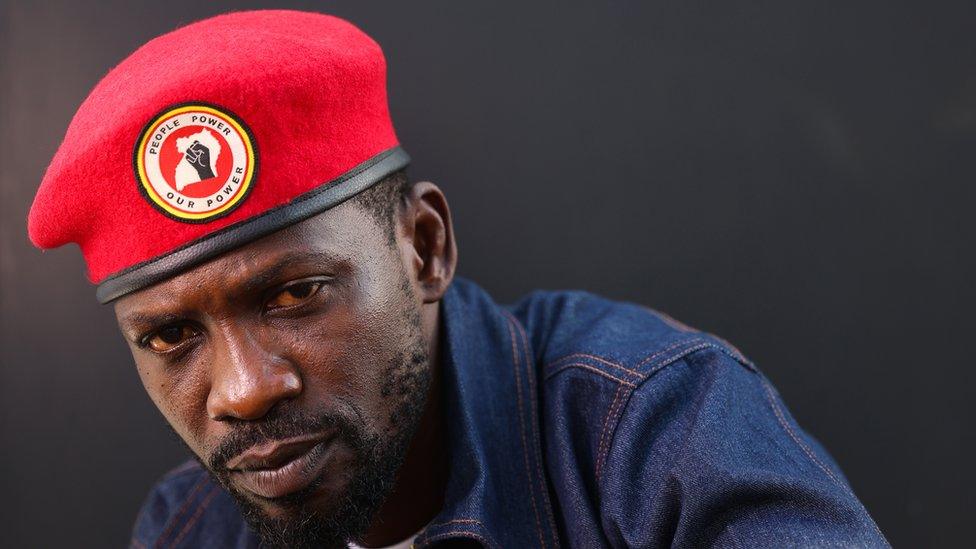Latest
Is Museveni Planning To Arrest Bobi Wine After Guilty Pleas by NUP Supporters

On October 14, National Unity Platform (NUP) supporter Olivia Lutaaya, along with 15 others, pled guilty to treachery and illegal possession of explosive devices, marking a crucial turn in a case that has drawn national and international attention. These individuals, seen by many as political prisoners due to their support for NUP’s former presidential candidate Robert Kyagulanyi Ssentamu, also known as Bobi Wine, were arrested during the turbulent period of 2020 and 2021.
The accused, including Ibrahim Wandera, Swaibu Katabi, and David Mafabi, faced allegations of possessing 13 restricted explosive devices found in regions across Uganda such as Jinja, Mbale, Kireka, and Kampala Central between November 2020 and May 2021. Initially pleading not guilty, the group reversed their position after four years of detention, entering guilty pleas before Brigadier Freeman Mugabe at the Court Martial.
Despite this, the case retains strong political undertones. Many believe these arrests were retribution for the individuals’ support of Bobi Wine, a prominent critic of President Yoweri Museveni’s government. The Ugandan government maintains that NUP supporters without criminal charges were released, yet these recent guilty pleas have raised questions about the pressures faced by incarcerated opposition supporters. While 16 supporters have admitted guilt, nine others maintain their innocence, fueling public discourse on the treatment of political detainees.
The situation underscores the complexity of Uganda’s political landscape, where opposition supporters often find themselves in prolonged legal battles. The proceedings have highlighted contrasting views between the state’s assertions of law enforcement and accusations of politically motivated arrests aimed at stifling dissent. Many question the transparency of these trials and the impact they may have on Uganda’s judicial integrity.
Implications for the National Unity Platform
The guilty pleas by 16 NUP supporters have ignited debate on the broader repercussions for the party and its leader, Bobi Wine. Human rights lawyer George Musisi asserts that the pleas are inconsequential for NUP’s leadership, attributing them to desperation rather than factual guilt.
“It’s understood that these individuals are pleading guilty because of the dire conditions they faced, not due to convincing evidence,” Musisi stated, suggesting a political motive behind their plea. He referenced comments by Youth and Children Affairs Minister Balaam Barugahara, who publicly claimed he would aid the group’s release, despite never formally engaging with them.
Musisi emphasized that Ugandan law limits appeals following a guilty plea, allowing only sentence reductions, not plea reversals. He stressed the future implications for these individuals, particularly younger members of NUP, who may face restrictions on travel and public office.
Senior counsel and political analyst Peter Walubiri added that the lengthy delay in evidence presentation, followed by sudden guilty pleas, raises significant questions about Uganda’s legal system. “This case highlights the deterioration of rule of law and reveals a judiciary under pressure,” Walubiri stated, advocating for reforms to protect the independence of Uganda’s judiciary.
Walubiri also criticized the use of the military court to try civilians and encouraged NUP to leverage this case to expose deficiencies in Uganda’s justice system. He argued that this ordeal underscores Uganda’s drift from democracy, positioning the detainees as political prisoners.
Makerere University lecturer Mwambutsya Ndebesa echoed this sentiment, viewing the situation as a fundamentally political issue needing a political solution. “The accused were political prisoners from the start. A legal resolution is inadequate for a case that is, at its core, political,” Ndebesa argued. He urged public support for the NUP detainees, asserting that their guilty pleas have minimal impact on the NUP’s leadership.
NUP Secretary-General Alleges Coercion
NUP Secretary-General Lewis Rubongoya strongly condemned the judiciary, accusing it of coercing NUP supporters into guilty pleas due to prison conditions. Rubongoya argued that Luzira prison authorities pressured detainees with ultimatums of indefinite detention if they did not admit guilt.
“Our supporters faced severe mistreatment, never receiving a fair trial,” Rubongoya said, citing the detainees’ incommunicado detention and trial before the Court Martial as political suppression rather than due process.
Rubongoya also dismissed allegations by former opposition leader Mathias Mpuuga that NUP negotiated for specific supporters’ release. “We have never negotiated for the release of anyone,” Rubongoya clarified, reaffirming NUP’s commitment to supporting its imprisoned members and their families.
Government Response
State Minister Balaam Barugahara viewed the guilty pleas as a vindication of the government’s position, citing Olivia Lutaaya’s confession as evidence against claims of wrongful imprisonment. Barugahara called for leniency in sentencing for those who admitted guilt, emphasizing their cooperation and expressing hopes that President Museveni would grant them pardon to facilitate reintegration.
These developments continue to highlight Uganda’s political tensions, underscoring the need for judicial scrutiny in cases involving opposition members. With the legal process ongoing, the situation remains a flashpoint in Uganda’s struggle for political transparency and fair treatment of opposition figures.
